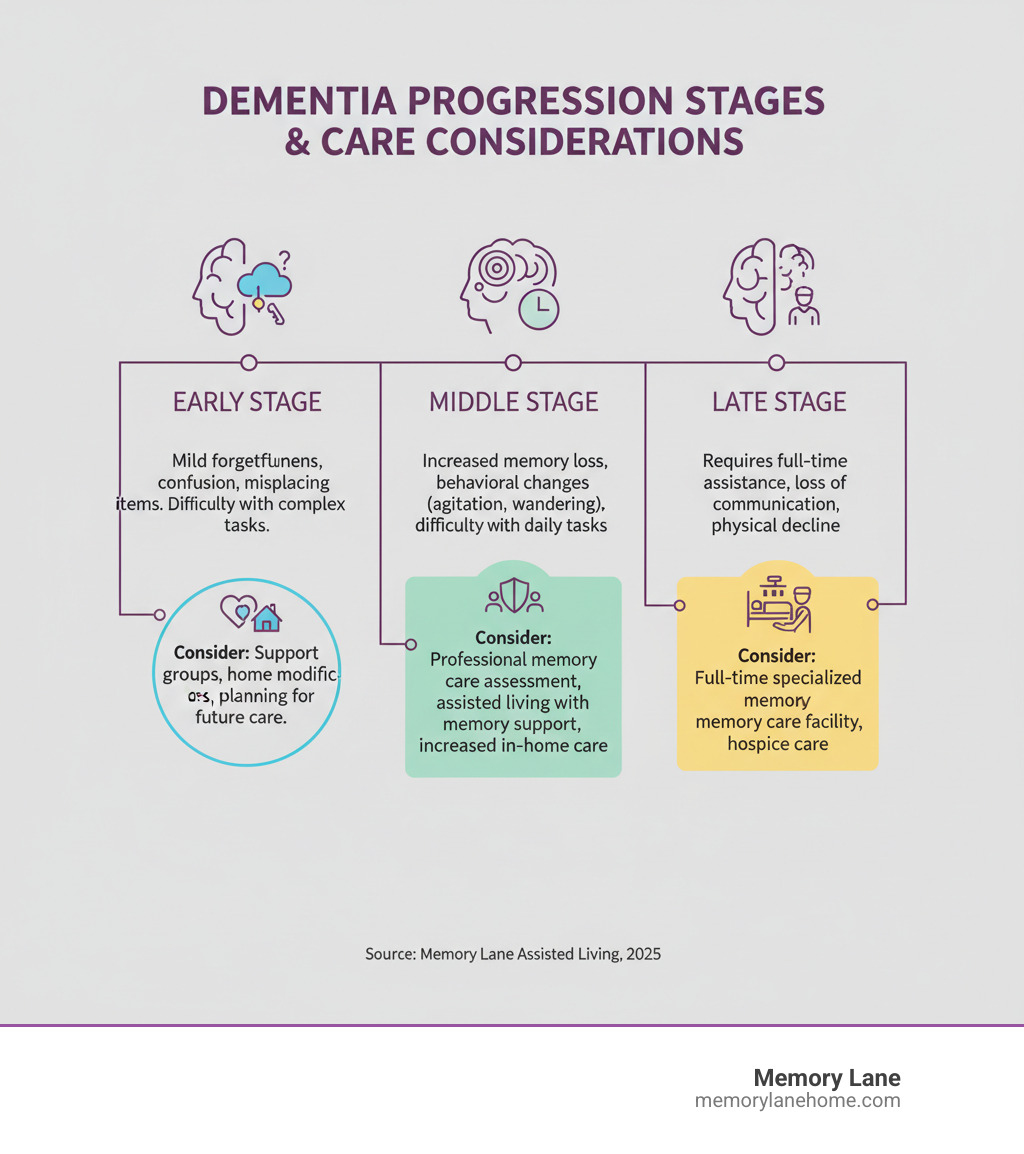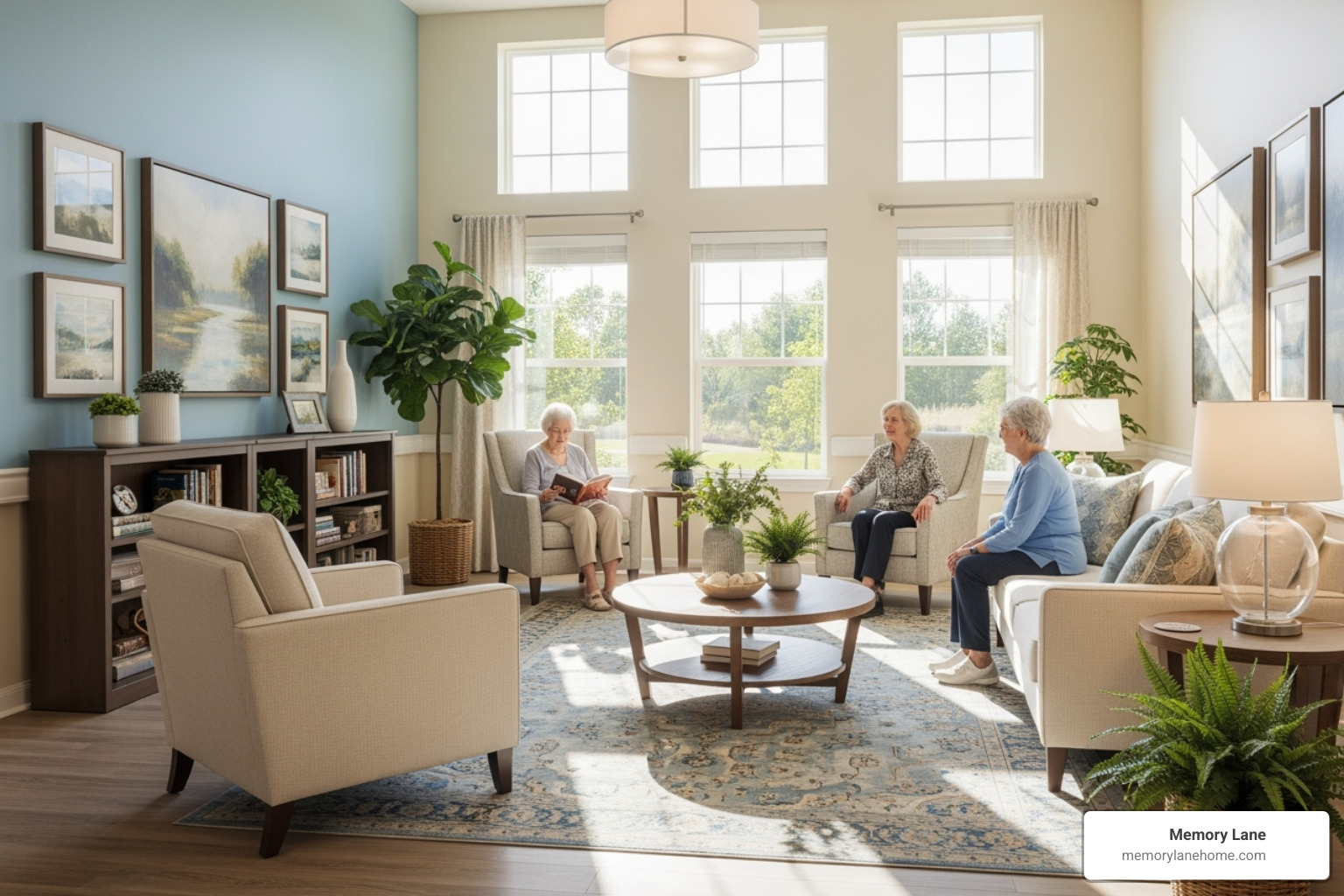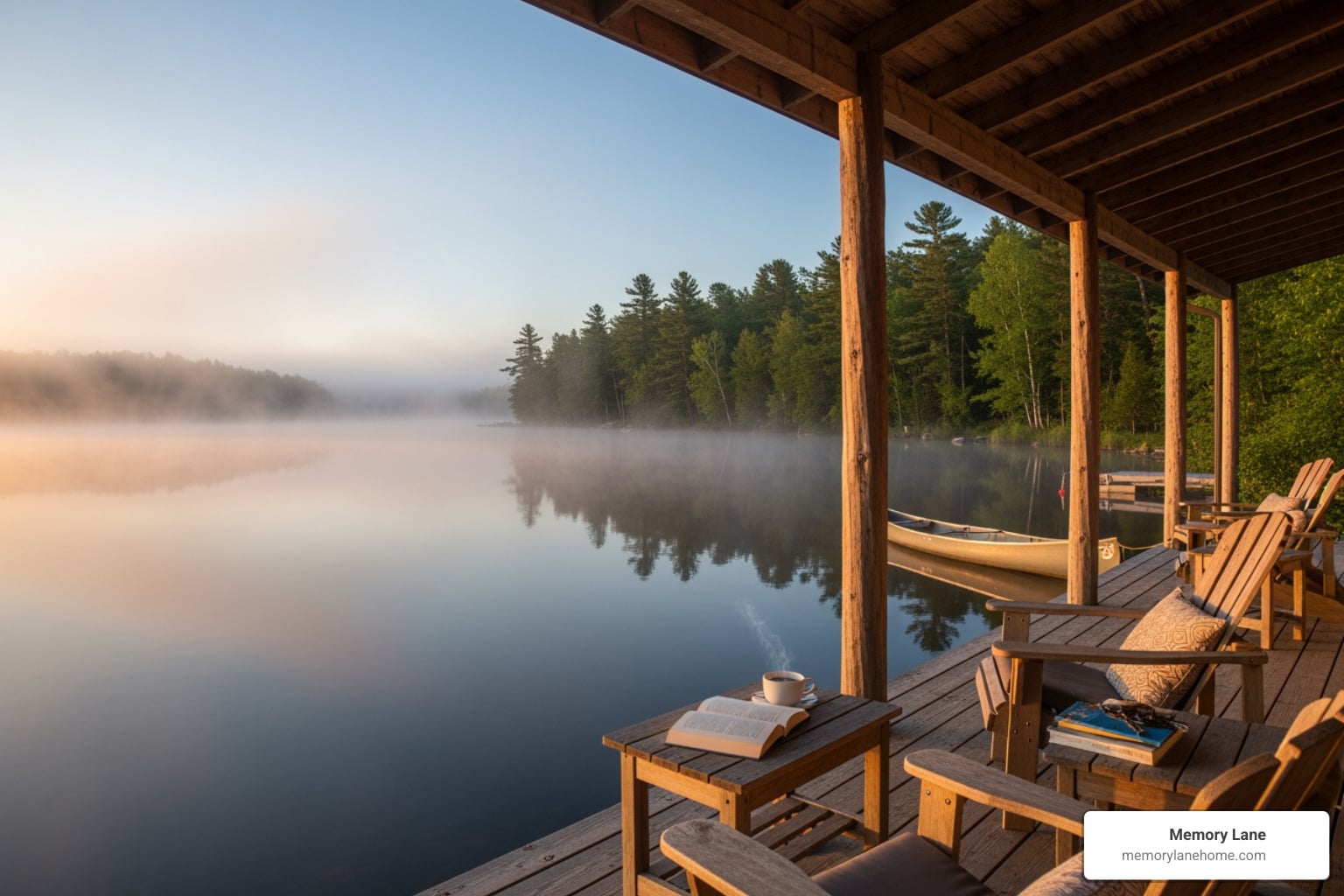Your guide to assisted living Michigan: explore costs, services, financial aid, and top communities for senior care.

Ann Arbor’s Best: A Comprehensive Look at Senior Living and Memory Care
Dementia Care Ann Arbor: Best 2025 Guide
Why Dementia Care Ann Arbor Matters for Your Loved One
Dementia care Ann Arbor provides specialized support for individuals with cognitive decline. These communities offer a safe environment, trained staff, and personalized programs to improve quality of life. Watching a loved one struggle with memory loss is overwhelming, but knowing when and where to find help is the first step.
Ann Arbor’s memory care landscape is unique, with an average review score of 8.3 reflecting a high standard of care. Options range from large communities to smaller, home-like residences.
Top Considerations for Dementia Care in Ann Arbor:
- Average Cost: $6,271 per month
- Facilities Available: 16 memory care communities
- Key Services: 24/7 awake staff, medication management, dementia behaviors care
- Specialized Features: Secure environments, cognitive activities, restaurant-style dining
When Should You Consider Memory Care?
It may be time to consider professional care when:
- Safety is a concern (wandering, medication errors).
- Caregiver burnout becomes overwhelming.
- Social isolation increases.
- Behavioral changes like aggression or anxiety escalate.
- Medical needs become too complex to manage at home.
I’m Jason Setsuda, a Board Certified Emergency Medicine Physician and CFO of Memory Lane Assisted Living. Through my medical experience, I’ve seen how the right memory care environment transforms the lives of residents and their families. We’ve developed specialized dementia care Ann Arbor families trust for compassionate, home-like support.

Understanding Memory Care and Senior Living Options
When exploring senior care, you’ll encounter terms like “assisted living” and “memory care.” While related, they serve different needs. Understanding the distinction is key to choosing the right support for your loved one’s safety and quality of life.
What is Memory Care and How Does it Differ from Assisted Living?
Memory care is a specialized form of residential care for individuals with Alzheimer’s and other forms of dementia. Unlike assisted living, which helps independent seniors with daily tasks, memory care provides a comprehensive support system designed for cognitive decline. The focus is on safety, cognitive support, and creating moments of joy.
Key features of memory care include:
- Secure Environments: Thoughtful design, such as keypad entries and enclosed outdoor spaces, prevents wandering while promoting freedom of movement.
- Cognitive Engagement: Activities are therapeutic, not just time-fillers. Music, art, and structured routines help stimulate the mind and provide purpose.
- Specialized Staff: Caregivers receive specific training in dementia care, communication techniques, and managing challenging behaviors with compassion.
- Higher Staff-to-Resident Ratios: Lower ratios, like our 1:3 daytime ratio at Memory Lane, allow for personalized care where caregivers know each resident’s story and preferences.
Assisted living is for seniors who need some help but are largely independent. Memory care is for those with moderate to severe cognitive impairment who require 24/7 supervision and a structured, secure environment. This increased level of specialized care, security, and staffing contributes to a higher cost but provides invaluable peace of mind.
For those exploring general senior living options, you can find more info about assisted living homes and more info about assisted living for seniors with disabilities in Ann Arbor.
| Feature | Assisted Living | Memory Care |
|---|---|---|
| Care Level | Assistance with ADLs (bathing, dressing, meds) | Specialized 24/7 support for cognitive impairment and dementia behaviors |
| Environment | Less structured, more independent living | Secure, structured, designed to reduce confusion, wandering prevention |
| Staff Training | General senior care, ADL assistance | Specialized training in dementia care, communication, and behavior management |
| Ideal Resident | Relatively independent seniors needing some support | Individuals with Alzheimer’s or other forms of dementia |
| Security | General safety measures | Improved security (keypad entry, enclosed courtyards, alarms) |
| Programming | Broad activities, often self-directed | Custom cognitive engagement, therapeutic activities, structured routines |
What to Expect from Dementia Care in Ann Arbor
When you seek dementia care Ann Arbor, you’ll find a community committed to high-quality, compassionate support that focuses on quality of life. It’s about creating an environment for joy, connection, and purpose.

Ann Arbor facilities understand that dementia care means honoring a person’s identity while supporting their current needs through cognitive stimulation and social connection.
Key Services in Dementia Care Ann Arbor
Memory care services are designed for the evolving needs of individuals with dementia. Expect comprehensive support that includes:
- 24/7 Support: Most facilities (93.8%) provide 24-hour awake staff, ensuring someone is always present and alert to help.
- Medication Management: Over 81% of communities offer full medication oversight, providing relief for families and ensuring doses are administered correctly.
- Dementia Behaviors Care: Staff at 75% of local facilities are trained to respond compassionately to challenging behaviors like agitation or confusion.
- Personal Care Assistance: Dignified help with bathing, dressing, grooming, and toileting is standard.
- Daily Living Support: Housekeeping, laundry, and meal preparation are handled by the community. Many offer restaurant-style dining (75%) and cater to special diets (vegetarian, low-sodium, etc.).
- Healthcare Coordination: Communities often coordinate with visiting physicians, therapists, and other healthcare professionals.
Cognitive Engagement and Social Connection
Quality dementia care Ann Arbor focuses on moments that bring joy and connection. At Memory Lane, our “Daily Path” of engagement provides a routine with purpose. Programs are designed to preserve cognitive function and improve well-being:
- Brain Fitness and Puzzles: Gentle mental challenges help maintain cognitive skills.
- Music and Art Therapy: These programs tap into long-term memories and offer non-verbal outlets for expression. 81.3% of local facilities have dedicated arts and crafts centers.
- Pet Therapy: The presence of animals can reduce anxiety and bring comfort. This is offered by 81.3% of facilities.
- Community Outings: Regular trips to parks, markets, and events help residents stay connected to the world around them.
- Family Engagement: We encourage family involvement and offer resources to support you through this journey.
These programs help residents maintain their sense of self and find joy each day. For more info about local memory care facilities, explore what makes Memory Lane different.
The Financial and Regulatory Landscape of Dementia Care Ann Arbor
Understanding the costs and rules of dementia care Ann Arbor will help you make confident decisions.
Average Costs of Memory Care in Ann Arbor
Memory care in Ann Arbor averages $6,271 per month, which is higher than state and national averages due to the area’s high standard of living and quality of care. Costs vary based on room type, with semi-private rooms starting around $5,344 and private units costing more.
Pricing structures also differ. Some facilities use tiered pricing, where costs increase with care needs. At Memory Lane, we offer transparent, all-inclusive pricing ($9,500/month for regular rooms, $9,900/month for master suites) that covers all care, meals, and supplies without hidden fees. When comparing, always ask what’s included in the monthly rate. For more info about long-term dementia care options, explore what fits your family’s budget.
Paying for Care and Financial Resources
While traditional Medicare does not cover long-term memory care, several resources can help:
- The MI Choice Waiver Program: This Michigan Medicaid waiver can help eligible individuals pay for care services (though not typically room and board). Find information on dementia from the State of Michigan for more resources.
- Long-Term Care Insurance: These policies are invaluable for covering memory care expenses. We accept them at Memory Lane.
- Veterans Benefits: The Aid and Attendance benefit can help veterans and their spouses pay for care.
- Private Pay: Most families use a combination of savings, pensions, or assets from selling a home.
- Life Insurance Policies: Some policies can be converted or accessed early to fund care.
Michigan State Regulations for Memory Care
Michigan’s regulations ensure resident safety and quality of care. All facilities must be licensed by the state and meet standards for health and safety. Key regulations include:
- Staff Training: Mandated, specialized training for caregivers on dementia, behavior management, and communication.
- Safety Protocols: Required security measures like secured exits and enclosed outdoor areas to prevent wandering.
- Resident Rights: Protection of a resident’s right to dignity, privacy, and involvement in their care.
- Medication Rules: Strict protocols for medication administration by trained staff.
These regulations provide a framework for safe, supportive, and professional dementia care Ann Arbor.
Choosing the Right Memory Care Community: A Step-by-Step Guide
Selecting a memory care community is about finding a home where your loved one can experience joy, dignity, and connection. A bright, welcoming space that feels familiar can significantly reduce confusion and anxiety.

Finding the Best Dementia Care in Ann Arbor
Finding the best dementia care Ann Arbor offers is a personal journey. Here’s how to approach it:
- Research and Recommendations: Start with online research and ask for recommendations from trusted sources like your loved one’s physician or a geriatric care manager.
- Schedule Multiple Tours: Visiting in person is essential. Pay attention to the atmosphere—does it smell and sound like a home? Are residents engaged and comfortable?
- Ask Thoughtful Questions: Inquire about staff training, staff-to-resident ratios, how they handle medical emergencies, and their care philosophy. Ask to see activity and meal calendars.
- Observe Interactions: Watch how staff engage with residents. Look for patience, respect, and genuine connection.
- Read Family Reviews: Look for patterns in reviews that give insight into daily life and how the facility handles challenges.
- Trust Your Instincts: After your research, your gut feeling about a place is important. You should feel the warmth and envision your loved one thriving there.
Key Features to Look For
As you evaluate communities, look for these indicators of high-quality care:
- Specialized Staff Training: Caregivers should have specific training in dementia care. In Ann Arbor, 75% of facilities offer this.
- Low Staff-to-Resident Ratio: This ensures personalized attention. At Memory Lane, we maintain a 1:3 daytime ratio.
- Dementia-Friendly Layout: The environment should be secure and easy to steer, with features like color-coding and enclosed outdoor spaces.
- Personalized Care Plans: Look for a person-centered approach that honors each resident’s history, preferences, and abilities.
- Quality Dining Experience: Nutritious, appealing meals are crucial. Many Ann Arbor facilities (75%) offer restaurant-style dining and accommodate special diets.
- Engaging Activity Calendar: A robust calendar with varied activities like art, music, and fitness is a sign of a vibrant community. Research on the benefits of community living for dementia patients confirms that social interaction and proper nutrition improve well-being.
Consider the home-like approach at Memory Lane, where our six-bedroom houses create an intimate, family-like setting. For more info about memory care at Memory Lane, we invite you to see the difference for yourself.
Frequently Asked Questions about Senior Care in Ann Arbor
Here are clear, honest answers to common questions about dementia care Ann Arbor.
What’s the difference between assisted living and memory care in Ann Arbor?
Assisted living is for seniors who are mostly independent but need help with daily tasks like bathing or medications. It offers a social, less-structured environment.
Memory care is a specialized form of assisted living for individuals with dementia. It provides 24/7 supervision in a secure setting with specially trained staff, a structured environment to reduce confusion, and therapeutic activities. The focus is on safety, cognitive engagement, and dignity for those with memory loss.
Do memory care facilities in Ann Arbor accept Medicaid?
While traditional Medicaid does not typically cover room and board in memory care, Michigan’s MI Choice Waiver program can help eligible individuals pay for care services. This can significantly offset the total cost. Other financial options include long-term care insurance (which we accept at Memory Lane), veterans benefits, and private pay. Always ask facilities about their payment policies and accepted resources.
How do I know if a memory care facility has well-trained staff?
Identifying well-trained staff is crucial. Here’s what to look for:
- Ask About Training: Inquire about specific dementia care certifications and ongoing education programs during your tour.
- Check the Ratio: Ask for the staff-to-resident ratio for both day and night shifts. A lower ratio, like our 1:3 daytime ratio, allows for more personal attention.
- Observe Interactions: Watch how caregivers communicate with residents. Look for patience, respect, and genuine connection.
- Inquire About Tenure: Low staff turnover is often a sign of a positive work environment and experienced, dedicated caregivers.
- Behavior Management: Ask how the facility responds to challenging behaviors. A quality provider will focus on compassionate, non-pharmacological approaches first.
Conclusion
Choosing care for a loved one with dementia is a profound decision. Finding the right dementia care Ann Arbor community can transform their life and bring your family peace of mind.
This guide has highlighted the key differences in senior living, emphasizing that memory care offers specialized environments, trained caregivers, and therapeutic engagement designed for those with cognitive decline. Ann Arbor provides excellent options, and knowing what to look for—from staff training and resident ratios to financial resources like the MI Choice Waiver—empowers you to make the best choice.
At Memory Lane, we believe care should feel like home. Our six-bedroom ranch houses create an intimate, familiar setting where residents are known and valued. With a 1:3 daytime staff-to-resident ratio, our caregivers build genuine relationships, sharing meals, activities, and laughter. We focus on creating moments of joy and purpose, ensuring dignity is maintained throughout the dementia journey.
An Alzheimer’s diagnosis is not the end of a meaningful life. With the right support, your loved one can continue to thrive. We invite you to see how our home-like environment makes a difference. Explore our compassionate assisted living homes to learn more about our unique approach, or contact us to schedule a tour and find the best path forward for your family.


